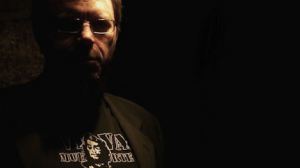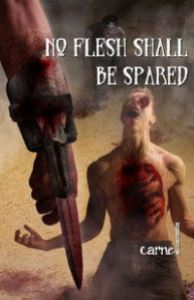What first attracted you to horror writing?
Horror is something I’ve been drawn to since a kid. I mean, the first movie I can remember seeing was Hush, Hush Sweet Charlotte. My Mom brought a carload of kids to see this new comedy she’d heard about at a local drive-in. We were a single parent household and this was in the mid-sixties and going to the movies was a really big deal. Anyway, this comedy turned out to be Hush, Hush Sweet Charlotte. Much to my mother’s chagrin, she‘d gotten the titles mixed up. Once she figured out her mistake, she told us to lie down and go to sleep in the back seat. Of course, I stayed awake and peeked through the seats. Scared me to death! From that moment on I was hooked. A few years later, I discovered this guy on a local television station, KTVU Channel 2 in Oakland, named Bob Wilkins. Bob was what was once called a horror host and I thought both he and the movies he was showing every weekend (Friday and Saturday night, one at 9pm… then the news… then a second movie right after) were so cool. Bob showed me that it was possible to be a regular guy and still be a fan of this type of stuff. A few years before Bob died, I got the chance to tell him about the influence he had on me. I said to him, “In many ways, you are more of a father to me than my biological father.” He thought I was being nice, but I was very serious. His influence on me was that extensive.
Once I’d gotten married and the kids started coming into the picture, I figured I should probably get a solid career going (I’d been working as a buyer for Tower Records). I felt compelled to go in a very specific direction and ended up enrolling in mortuary college in 1990. Once I graduated, I worked as a funeral director/embalmer on and off for like ten years.
So… life-long horror fan… embalmer… horror was about the only place I could’ve ended up.
What is your most notable work?
Well, that depends. I’m exceptionally lucky in that I wear a few hats in the horror field. One is that of a journalist & podcaster and the other, a fiction writer. The journalism really came about as kind of a fluke. In 1994, my wife and I created a ‘dark culture’ magazine in the mid Nineties called Carpe Noctem and I just jumped in doing articles and interviews for that. Not thinking too hard about it, really. I just sort of learned as I went. Luckily, I had a bit of a natural acumen for it (especially interviewing) and things went well. When Carpe Noctem went away, I’d become friends with Tony Timpone at Fangoria by then and he brought me on there. I joined Dread Central about a year ago and now I’ve added a few other sites like Twitch. The Night Crew podcast came about as a result of my becoming friends with Sean “The Butcher” Smithson (another Fangoria & Twitch writer).
The fiction writing, well, that’s something I’ve always done. I mean, I remember turning in a story in the 2nd grade called A Man For All Seasons which was kind of a ‘super hero meets Island of Dr Moreau’ thing about a guy who has parts of animals surgically attached to his body. I remember getting in trouble because there were a lot of horror elements thrown in like the main guy ripping his foes to shreds. Writing stories is just something I’ve done for as long as I can remember. I did a Creative Fiction class in college, but that was awkward. The final was to turn in a complete, sellable story, which I did. The thing was, there was a lot of horror in it and a lot of sex. I was told that the story was well written, but that ‘no one will ever buy it.’ The semester ended, I left the class, and sold the story to Swank Magazine a month later.
Most notable work though…Well, in journalism, I’d say the creation of Carpe Noctem… followed quickly by my on-going relationship with Fangoria.
Fiction, it’d probably be my first novel, No Flesh Shall Be Spared.
Journalism: At this moment, I have a few interviews in the pipe (Barbara Magnolfi from Suspiria, Queensryche’s singer Geoff Tate, Michael Biehn from Aliens, I have a talk with Elvira scheduled in a week or so), an Underworld 4 set visit to write up, a convention wrap-up to do, and some reviews to write for the podcast. After that I have to prep for a Zoe Bell interview, hunt down Diamanda Galas for a Fango interview I pitched, do research for a scheduled Simon Rumley chat, and then there’s The Night Crew’s Episode seven to mix, the scheduling and research for Episode seven…well, you get the idea. These are the kinds of things that are always lingering around on my plate. Who knows? Tomorrow something else may come up and throw this whole schedule into disarray.
Fiction: I’m scheduled to start the sequel (and second book in the trilogy) to No Flesh Shall Be Spared (tentatively titled Don’t Look Back) pretty damn soon. The sequel is going to have a lot more action and be a lot more kinetic. I’ve already established the world the story is set in. I just need to metaphorically get my characters back into the same room, pull the pin on a grenade, and throw it inside. As outlined, Don’t Look Back is a continuation of the world of No Flesh, but The League’s owner has now come up with a new game and, of course, the stakes are higher this time out. My friend, filmmaker & writer Richard Valentine (The Taken), once said of one of his films, “If there’s any exposition to be done, it’ll be done while the characters are running or shooting.” I’ve really taken that philosophy to heart. This time out shit’s getting blown up, a lot of people are going to die, and the ending is… well, I have something pretty exciting – and unexpected – planned. After that, I go straight onto the series’ finale.
Who do you admire in the horror world?
Writers? Let’s see… Clive Barker (amazing writer and a really nice guy), Neil Gaiman (he taught me a lot about writing and I bet he doesn’t even know that he did it), Joe Lansdale (I love his writing voice), Phillip Nutman (another awesome guy and great writer), Craig Spector (he believed in me when no one else did and is another terrific writer).
As for the non-fiction world, Chris Alexander (new editor of Fangoria), Tony Timpone, Sean “The Butcher” Smithson, I’ll throw in Phillip Nutman’s name again, Todd Brown at Twitch, Uncle Creepy at Dread Central, all of the guys who work on The Night Crew. All of these folks are the best there is at this shit and I’m honoured to call them all friends.
Do you prefer all out gore or psychological chills?
Difficult to say really. I like both when they’re done right. Sadly though, they’re rarely done right. I like originality in my reading. I like boldness, bravery, a sense of internal logic. I hate it when writers ‘get cute’ with a concept and they start dickin’ around with their own rules. I hate ‘monsters’ that aren’t scary. I hate action scenes that are boring. I hate people who don’t know how to fight trying to write a god damn fight scene. I like writers who understand that there’s only so much a reader will swallow. I love writers who have a unique voice. I like authors who have some scars, y’know? Authors who have seen some shit and aren’t afraid to write about it. Nothing pleases me more than to pick up a book or watch a film and know – not think, know – that the creator of it wants to seriously hurt me with his work.
Gore is a necessity in this field and whether or not it’s needed depends upon the story. I hate ‘sanitised’ violence. When someone dies in real life, it’s a messy thing. Show me that. Give that character’s death importance – and respect – by laying it out realistically. However, when that ‘laying it out’ drifts into fetishisation, then we have a problem. It’s no longer about detailing an event in an accurate manner. Now, it’s about someone’s almost pornographic fixation.
As for psychological chills, I love it if it is done successfully. I love a slow, suspenseful story. Robert Wise’s The Haunting, Alejandro Amenabar’s The Others, Peter Medka’s The Changeling, Jacques Tourneur’s I Walked With a Zombie, Peter Straub’s Shadowland, George RR Martin’s Fevre Dream all nail it. Sadly a lot of writers don’t. I have a tough time with it, it’s why my stuff is all hook-punches, reverse-roundhouse kicks, whizzing blades, and automatic weapons [laughs].
Why should people read your work?
Ooh, good question! Well, as far as fiction goes I’d like to think it’s because it’s different. I mean No Flesh Shall Be Spared is not your average zombie novel. Most zombie books are based on what I call a ‘siege mentality.’ That is to say, the ‘Help! There’s zombies at the door and they’re trying to get in and eat me!’ mode of thinking. No Flesh takes place like 10+ years after the zombie apocalypse. Man has gotten a grip on things. Life has pretty much returned to normal. The dead returning is now a given. However, as mankind gets back on its feet, they’re still pretty sore about the way the whole thing went down. And, people being people, a lot of them want to see the whole thing get a ‘do over’ if you will. So, from that desire a new sport comes about which allows them to have just that. I pitched the book as ‘Gladiator meets Dawn of the Dead’ and that’s pretty close. It’s the UFC with a shit-ton of zombies. I mean, each match lets fifty zombies loose in an enclosed fighting place in fifteen minutes. It’s martial arts. It’s intrigue. It’s Brock Lesnar fist-fighting your undead grandmother. There are some chapters included that show a bit of that first outbreak, but they’re used mostly for the establishment of character, to show you a bit of who they were. So, yeah this is not something audiences have seen before. Hopefully, with my knowledge of the horror genre and my background in both funeral service and martial arts, they’ll find it fun and exciting. So far, that seems to be the case.
Recommend a book.
Well here’s a list. I love the aforementioned Fevre Dream by George RR Martin. No one ever talks about how good that book is. I’m not a vampire fiction fan Carpe Noctem pretty much cured me of that, but Martin’s novel just rocks. Let’s see people should pick up literally anything by Joe R. Lansdale, Phil Nutman’s Cities of Night, Lorelei Shannon’s Possum Kingdom, Kathe Koja’s Skin, anything by Brian Hodge, Skipp & Spector’s Book of the Dead 1 & 2, Stewart O’Nan’s A Prayer for the Dying.
As far as books that went into the development of No Flesh Shall Be Spared, Stephen Pressfield’s amazing Gates of Fire, Eiji Yoshikawa’s Musashi, Dave Grossman’s On Killing: The Psychological Cost of Learning to Kill in War and Society, Laurence Gonzales’ Deep Survival: Who Lives, who dies, and why and Rory Miller’s Meditations on Violence. That should keep you busy for a while.






